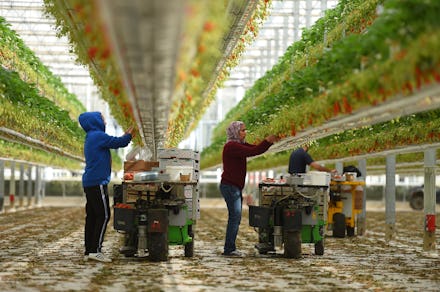Coronavirus could be coming for our organic produce

Despite coronavirus and the social distancing measures it's inspired, for the most part our grocery stores are still stocked and farms haven't seen any large-scale disruptions. But what happens when the pandemic causes workers to fall ill or limits an employee's ability to work in a team? Consumers could see crop shortages and higher prices for certain products, reports the Scientific American in a look at how coronavirus has disrupted the farming industry. Although supplies of 'staple crops' such as rice and wheat so far remain safe from the effects of the virus, farmers growing specialized produce, like strawberries and blueberries, might face problems.
As summer approaches, farms usually get ready for the rest of the year's work by hiring more employees and taking orders from stores, restaurants, and other markets. But the pandemic has changed everything. Employees are allowed to work, since agriculture is considered an 'essential' business, but they still have to follow social distancing rules. This impacts their ability to operate as a team, picking or pruning or cleaning away rotten plants. Restaurants closing down and markets with limited hours gives smaller farmers fewer places to sell their produce. And international travel restrictions create labor shortages for the farms that depend on seasonal workers from outside the U.S.
To be clear, the International Food Policy Research Institute reported earlier this month that "there are no major concern[s] for global food security yet." Still, smaller farms could face unique challenges that larger operations with less human-to-human contact can avoid.
Strawberries were one example the Scientific American noted. These delicate berries become ripe within a very narrow timeline, typically just 2-3 days, and must be picked quickly before they rot. If workers are spaced out far between rows, it could slow down the harvesting process, causing some strawberries to rot. Whatever rots must be disposed of before it can spread to healthy berries. The slow harvest, in combination with a rot that can take out berries, could create a shortage of strawberries — making the produce more expensive to sell.
This hurts both farmers and consumers. "Being slower is expensive," farm adviser Mark Bolda told Scientific American.
Strawberries aren't the only crop in trouble. Apple orchards are at risk of being unpruned due to labor shortages, with many workers coming from overseas, leading to future losses as the health of the trees decline. Blueberry farmers rent honeybees to encourage plant pollination, but the beekeepers have to transport the hives using flatbed trucks which require special expertise to operate. If those truckers get sick, then the whole supply system will slow down and drastically decrease blueberry yields.
These are scenarios that make farmers nervous. "Everybody is scrambling to figure out what to do," Gail Feenstra, deputy director of UC Davis's Sustainable Agriculture Research and Education Program, told Scientific American. "There’s just a lot of disruption."
Agricultural experts weren't caught completely off-guard by Covid-19. A 2006 World Bank report predicted that a pandemic would hit farms with specialized crops fairly hard. Not only do the farms have to worry about a shortage of workers and new regulations that restrict human activity during the outbreak, but also about losing places at which to sell their food, as many specialty growers sell directly to restaurants. Also, they face the added burden of a customer base that may not be able to afford their products due to their own precarious financial situations.
Some in the agricultural industry are looking for alternatives to save themselves from further losses. Some wineries and vineyards have reportedly turned to online sales to ease their woes. In New York, where social distancing is more important than ever to stem the outbreak, a few businesses have seen a surge in sales and wine deliveries as residents seek something to indulge in while in isolation. But farmers and owners remain nervous about how long their businesses can last without their traditional tasting rooms. Some tasting room staff have already been laid off.
And, as if the virus isn't enough, there's still Mother Nature to contend with. Unfortunately, natural disasters like floods and hurricanes don't self-isolate. Farmers still have to deal with any losses caused by extreme weather events. With farmers having to potentially deal with both the social effects of the virus and the prospect of natural disasters, it's completely possible we could see a shortage of the precious fruits and produce we took for granted for so long.